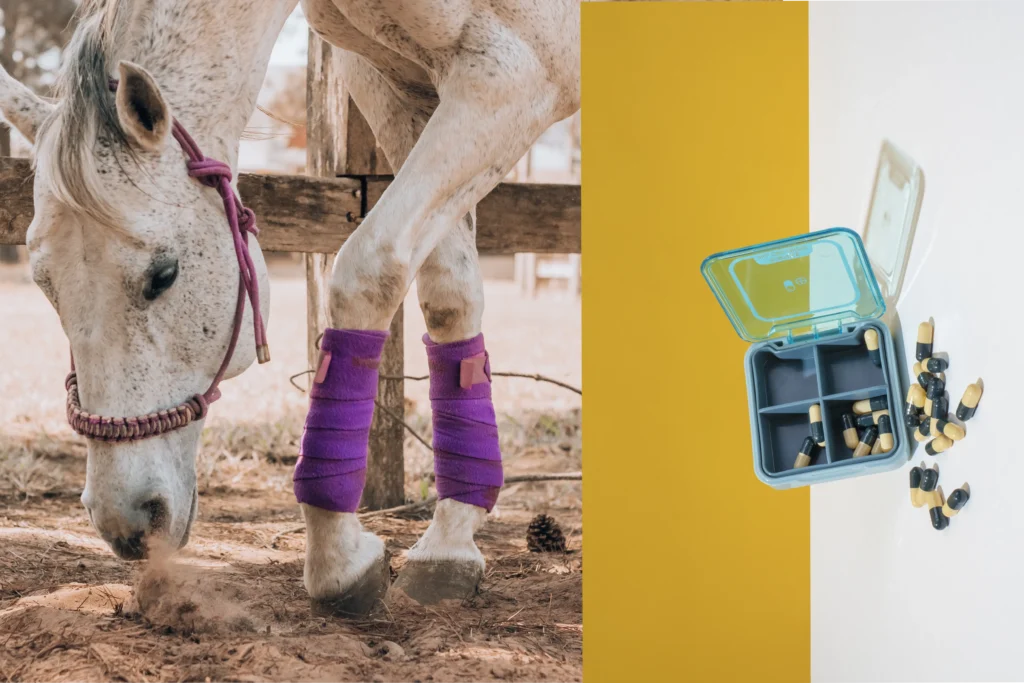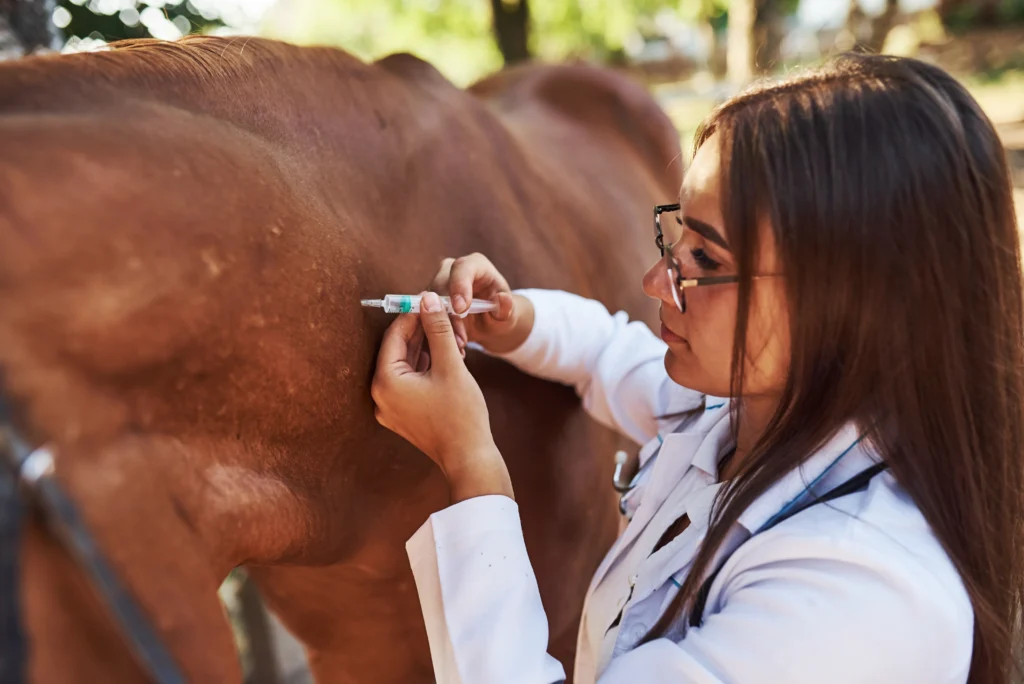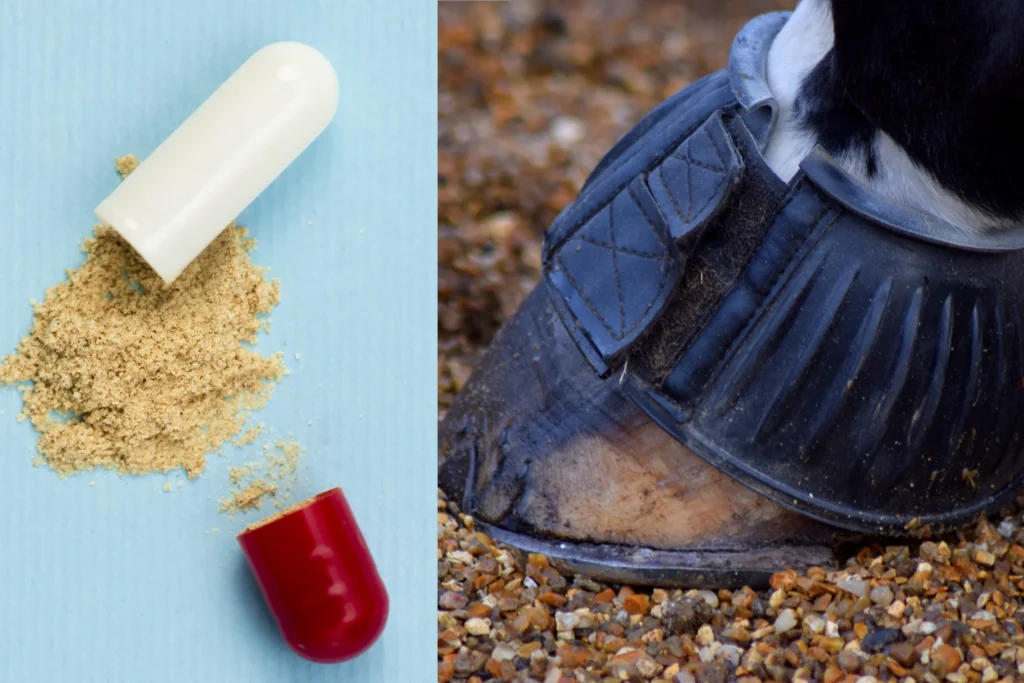Maintaining your horse’s joint health is crucial for their performance, comfort, and longevity. With hundreds of products on the market, choosing effective joint supplements for horses can feel overwhelming. Many equestrians make critical mistakes when selecting and administering joint supplements for horses, potentially wasting money and, more importantly, failing to provide their equine partners with the support they need.
According to the American Association of Equine Practitioners (AAEP), joint problems are among the most common issues affecting horses across disciplines and age groups. Proper supplementation can play a significant role in maintaining joint health and managing existing conditions, making the selection of appropriate joint supplements for horses an essential aspect of responsible horse care.
Whether you’re considering supplements for prevention, supporting an active performance horse, or seeking joint supplements for senior horses, understanding the common pitfalls can help you make more informed decisions. This comprehensive guide explores the seven worst mistakes horse owners make when choosing joint supplements for horses and provides evidence-based guidance to help you avoid these errors.
Mistake #1: Ignoring Individual Needs and Conditions
One of the most common errors when selecting joint supplements for horses is taking a one-size-fits-all approach. Horses have individual needs based on their age, discipline, existing conditions, and genetic predispositions.
The Problem with Generic Approaches
Dr. Eleanor Kellon, veterinary expert in equine nutrition and supplements, explains that different joint issues require different nutritional approaches. “Osteoarthritis, developmental orthopedic disease, and acute inflammation all have distinct underlying mechanisms,” notes Dr. Kellon. “The joint supplements for horses that benefit one condition may not be optimal for another.”
According to research published in the Journal of Equine Veterinary Science, horses with existing cartilage damage may benefit from different supplemental ingredients than those needing preventative support. This highlights why generic joint supplements for horses may not address your horse’s specific needs.
Senior Horses vs. Performance Athletes
The requirements for joint supplements for senior horses often differ significantly from those of young performance athletes:
- Senior horses typically benefit from higher levels of anti-inflammatory compounds
- Performance horses may need more support for cartilage production and protection
- Growing horses have unique needs related to proper joint development
Research from the Veterinary Clinics of North America: Equine Practice indicates that joint supplements for senior horses often need to address multiple aspects of joint degeneration simultaneously, while younger horses may benefit more from preventative formulations.
How to Avoid This Mistake
To select appropriate joint supplements for horses based on individual needs:
- Consult with your veterinarian for a proper assessment of your horse’s joint health
- Consider your horse’s discipline and workload
- Take into account age-related factors
- Evaluate existing conditions or predispositions
- Create a supplementation plan tailored to your specific horse
Dr. Lori Warren, equine nutritionist at the University of Florida, recommends: “Start with a clear understanding of what you’re trying to accomplish with supplementation. Prevention, maintenance, and therapeutic support are different goals requiring potentially different approaches to joint supplements for horses.”
Mistake #2: Falling for Marketing Claims Without Scientific Evidence

The market for joint supplements for horses is flooded with products making impressive claims, many without substantial scientific backing. This leads many horse owners to make purchasing decisions based on marketing rather than evidence.
The Problem with Unsubstantiated Claims
According to the UC Davis School of Veterinary Medicine, many joint supplements for horses make claims that exceed what research has actually demonstrated. Dr. Jorge Nieto, specialist in equine surgery at UC Davis, cautions that “the gap between marketing claims and scientific evidence for many equine joint supplements is substantial.”
A systematic review published in The Veterinary Journal found that only a small percentage of commercially available joint supplements for horses have been subjected to controlled clinical trials. This lack of research makes it difficult for horse owners to make evidence-based decisions.
Reading Equine Joint Supplements Reviews Critically
When exploring equine joint supplements reviews, it’s important to distinguish between anecdotal reports and scientific evidence. While user experiences can provide valuable insights, they should not be the sole basis for selecting joint supplements for horses.
The Equine Science Society recommends looking for reviews that:
- Reference specific improvements in measurable parameters
- Include veterinary assessments when possible
- Discuss both benefits and limitations
- Cover longer periods of consistent use
- Acknowledge variations in individual response
How to Avoid This Mistake
To make evidence-based decisions about joint supplements for horses:
- Look for products with ingredients studied specifically in horses (not just humans or other animals)
- Seek supplements from companies that invest in research
- Review scientific literature through resources like PubMed or the Equine Veterinary Journal
- Consult with veterinarians who stay current on equine joint research
- Be skeptical of miraculous claims or “proprietary blends” without disclosed ingredients
Dr. Wendy Pearson, researcher in equine nutraceuticals at the University of Guelph, advises: “The best joint supplements for horses are those with ingredients that have demonstrated bioavailability and efficacy in equine studies, not just theoretical benefits based on laboratory tests.”
Mistake #3: Overlooking Quality and Manufacturing Standards
Not all joint supplements for horses are created equal, even when they list similar ingredients. Manufacturing practices, quality control, and ingredient sourcing dramatically affect supplement efficacy.
The Problem with Poor Quality Control
The supplement industry is less regulated than pharmaceuticals, creating significant variation in product quality. According to the National Animal Supplement Council (NASC), quality concerns with joint supplements for horsesinclude:
- Inaccurate labeling of active ingredient amounts
- Contamination with unwanted substances
- Poor bioavailability due to manufacturing processes
- Inconsistency between batches
- Use of low-quality raw ingredients
Research published in the Journal of Equine Veterinary Science found that some joint supplements for horsescontained less than 30% of the labeled amount of active ingredients, while others exceeded labeled amounts, creating potential dosing issues.
Third-Party Verification
Selecting joint supplements for horses from manufacturers that participate in third-party quality verification programs can help ensure you’re getting a quality product. Programs like the NASC Quality Seal indicate that manufacturers follow specific quality control standards.
How to Avoid This Mistake
To ensure you’re selecting quality joint supplements for horses:
- Look for products with the NASC Quality Seal or similar third-party verification
- Research the manufacturer’s quality control processes
- Contact companies about their testing protocols and be wary if they’re reluctant to share information
- Select supplements manufactured in facilities that follow Good Manufacturing Practices (GMP)
- Consider products from companies that specialize in equine supplements rather than those that treat horses as a sideline to human or pet supplements
Dr. Teresa Burns, equine internal medicine specialist at The Ohio State University, notes: “Quality manufacturing directly impacts whether the active ingredients in joint supplements for horses reach their target tissues in therapeutic amounts. This makes manufacturer selection as important as ingredient selection.”
Mistake #4: Focusing on a Single Ingredient Instead of Comprehensive Formulations
Many horse owners focus exclusively on one popular ingredient—often glucosamine—when selecting joint supplements for horses, missing the benefits of comprehensive formulations that address multiple aspects of joint health.
The Limitations of Single-Ingredient Approaches
While ingredients like glucosamine for horses joints have received significant attention, research increasingly suggests that combination approaches may be more effective. According to studies from the Colorado State University Equine Orthopaedic Research Center, joint health involves multiple biological processes that may benefit from different nutritional interventions.
Dr. Wayne McIlwraith, renowned equine joint researcher, has published findings indicating that combinations of ingredients in joint supplements for horses may have synergistic effects greater than single components used alone.
Key Components in Comprehensive Formulations
Research supports the inclusion of multiple ingredients in joint supplements for horses:
- Glucosamine for horses joints: Provides building blocks for cartilage synthesis
- Chondroitin for horses: Helps inhibit enzymes that break down cartilage
- MSM for horses joints: Offers anti-inflammatory properties and supports collagen formation
- Horse joint supplements with hyaluronic acid: Improves synovial fluid properties
- Anti-inflammatory compounds like devil’s claw for horse joint pain
The American College of Veterinary Surgeons notes that comprehensive joint supplements for horses may address inflammation, cartilage protection, and joint fluid quality simultaneously, potentially providing more complete support.
How to Avoid This Mistake
To select more comprehensive joint supplements for horses:
- Look for products that address multiple aspects of joint health
- Understand how different ingredients complement each other
- Consider formulations tested as combinations rather than assuming mixing single-ingredient supplements will have the same effect
- Consult with your veterinarian about which combination of ingredients might best address your horse’s specific needs
- Recognize that higher amounts of a single ingredient aren’t necessarily superior to balanced formulations
Dr. Stacey Oke, veterinarian and equine health writer, explains: “The best approach to joint supplements for horsestypically involves multiple ingredients that work through different mechanisms to support overall joint health, rather than focusing on a single ‘miracle’ ingredient.”
Mistake #5: Ignoring Dosage and Administration Guidelines
Even the highest quality joint supplements for horses won’t be effective if not administered properly. Incorrect dosing, inconsistent administration, and poor timing relative to work schedules can all undermine supplementation efforts.
The Importance of Proper Dosing
Research published in the Equine Veterinary Journal indicates that many joint supplements for horses are underdosed in real-world settings. This is particularly problematic since many joint supplement ingredients have dose-dependent effects, meaning inadequate amounts may provide little to no benefit.
Dr. David Ramey, equine veterinarian and critical evaluator of supplements, notes: “Many commercial joint supplements for horses contain ingredients at levels well below those shown to be effective in research studies, creating a situation where owners are spending money without getting results.”
Loading Doses vs. Maintenance Doses
Many joint supplements for horses, particularly those containing chondroitin for horses and glucosamine for horses joints, are more effective when started with a higher loading dose. According to Kentucky Equine Research, this loading period allows for faster accumulation of beneficial compounds in joint tissues.
However, many horse owners skip this critical loading phase, potentially delaying or reducing benefits from their chosen joint supplements for horses.
Consistency Challenges
The American Veterinary Medical Association (AVMA) emphasizes that consistency is crucial for supplement efficacy. Irregular administration of joint supplements for horses can significantly reduce their effectiveness, particularly for ingredients that work through cumulative effects rather than immediate action.
How to Avoid This Mistake
To ensure proper administration of joint supplements for horses:
- Follow manufacturer guidelines for both loading and maintenance doses
- Create systems that ensure daily administration (feeding charts, automatic reminders)
- Consider supplement palatability and delivery method—powders, pellets, and liquids have different acceptance rates
- Establish a consistent administration schedule that works with your barn routine
- Use strategies like mixing supplements with a small amount of a consistent carrier feed
Dr. Lydia Gray, veterinarian and equine health expert, advises: “With joint supplements for horses, consistency and correct dosing are just as important as ingredient selection. A mediocre supplement given properly may outperform a superior product given inconsistently or incorrectly.”
Mistake #6: Expecting Immediate Results Without Allowing Adequate Time

Many horse owners abandon potentially beneficial joint supplements for horses prematurely when they don’t see immediate improvements, failing to understand the biological timeframes required for certain ingredients to take effect.
Realistic Timelines for Different Supplements
According to research from the University of Maryland Equine Studies Program, different ingredients in joint supplements for horses have varying onset times:
- Omega-3 fatty acids: Anti-inflammatory effects may begin within 2-3 weeks
- Glucosamine for horses joints and chondroitin for horses: Typically requires 4-6 weeks for noticeable effects
- MSM for horses joints: May show more rapid effects, sometimes within 7-14 days
- Devil’s claw for horse joint pain: As an herbal anti-inflammatory, often shows effects within 2-3 weeks
- Horse joint supplements with hyaluronic acid: Oral forms typically require 3-4 weeks for noticeable benefits
Dr. Hilary Clayton, renowned equine biomechanics researcher, explains that “structural changes to joint tissues take time. The best joint supplements for horses are those given sufficient time to work, which means committing to at least 6-8 weeks of administration before evaluating efficacy.”
Why Some Ingredients Take Longer
The timeline for various joint supplements for horses depends on their mechanism of action:
- Cartilage-supporting compounds like glucosamine work by gradually enhancing the production of new cartilage components
- Anti-inflammatory ingredients may work more quickly but still require time to reduce existing inflammation
- Ingredients that improve synovial fluid quality need time to influence joint fluid composition
Research published in the Journal of Veterinary Pharmacology and Therapeutics highlights that the cumulative nature of many joint supplements for horses necessitates patience and consistent administration.
How to Avoid This Mistake
To give joint supplements for horses an appropriate trial:
- Research realistic timelines for the specific ingredients in your chosen supplement
- Establish baseline measures before starting supplementation (flexibility, willingness to perform certain movements, etc.)
- Commit to the manufacturer’s recommended trial period (typically at least 30 days)
- Keep a journal of observations to track subtle changes
- Consider having your veterinarian perform objective measurements before and after the trial period
Dr. Katherine Houpt, veterinary behaviorist, suggests: “Document your horse’s movement and comfort objectively when starting new joint supplements for horses. Video recordings can help you notice subtle improvements that might be missed day-to-day.”
Mistake #7: Neglecting the Role of Natural Supplements and Whole-Diet Approach
Many horse owners focus exclusively on commercial formulations while overlooking the potential benefits of natural joint supplements for horses and the importance of a whole-diet approach to joint health.
The Value of Dietary Foundations
According to the American Horse Council’s Equine Welfare Committee, the foundation of joint health begins with proper overall nutrition. Without appropriate baseline nutrition, even the best joint supplements for horses may have limited effectiveness.
Dr. Joe Pagan, founder of Kentucky Equine Research, emphasizes: “Before looking at specialized joint supplements for horses, ensure the basic diet provides adequate quality protein, appropriate mineral balance, and essential fatty acids—all critical components for joint tissue maintenance.”
Natural Anti-Inflammatory Compounds
Research from the University of Wisconsin Veterinary School has identified several natural joint supplements for horses with scientific support:
- Turmeric/curcumin: Contains potent anti-inflammatory compounds
- Boswellia: Shows effects similar to non-steroidal anti-inflammatory drugs in some studies
- Omega-3 fatty acids from flax or fish oil: Modify inflammatory pathways
- Devil’s claw for horse joint pain: Traditional herb with research supporting its anti-inflammatory properties
- Antioxidant-rich foods like blueberries and spirulina: Help manage oxidative stress that can damage joints
These natural options can complement or sometimes replace synthetic joint supplements for horses, particularly for animals sensitive to certain ingredients.
The Impact of Weight Management
The Virginia-Maryland College of Veterinary Medicine emphasizes that no joint supplements for horses can overcome the negative effects of excess weight. Research shows that obesity dramatically increases inflammatory markers and mechanical stress on joints, potentially negating supplement benefits.
How to Avoid This Mistake
To implement a more holistic approach to joint health:
- Ensure proper baseline nutrition before adding specialized joint supplements for horses
- Consider incorporating naturally anti-inflammatory foods into the diet
- Maintain appropriate body condition to reduce mechanical stress on joints
- Evaluate the entire management program, including turnout, exercise, and hoof care
- Work with an equine nutritionist to integrate natural joint supplements for horses into a complete feeding program
Dr. Juliet Getty, equine nutritionist, advises: “The most effective approach to joint health combines appropriate joint supplements for horses with a foundation of anti-inflammatory whole foods and proper weight management, creating a comprehensive program rather than relying on supplements alone.”
Choosing the Right Joint Supplements for Your Horse

With an understanding of these common mistakes, you can make more informed decisions about joint supplements for horses for your equine partner. Here’s a structured approach to selecting appropriate supplementation:
Step 1: Veterinary Assessment
Begin with a thorough veterinary evaluation to:
- Identify existing joint issues or areas of concern
- Establish a baseline for measuring improvement
- Determine if your horse needs preventative support or therapeutic intervention
- Consider diagnostic imaging if performance issues suggest joint problems
The American Association of Equine Practitioners recommends veterinary involvement in supplement decisions, particularly for joint supplements for senior horses or animals with diagnosed conditions.
Step 2: Research Key Ingredients
Different components in joint supplements for horses address different aspects of joint health:
- Glucosamine for horses joints: Provides building blocks for cartilage components
- Chondroitin for horses: Helps prevent cartilage breakdown
- MSM for horses joints: Offers anti-inflammatory effects and supports collagen
- Horse joint supplements with hyaluronic acid: Supports synovial fluid quality
- Omega-3 fatty acids: Modulate inflammatory processes
- Avocado/soybean unsaponifiables (ASU): Support cartilage metabolism
- Devil’s claw for horse joint pain: Provides natural anti-inflammatory effects
The Veterinary Institute for Regenerative Medicine suggests selecting products containing ingredients with research supporting both their bioavailability and efficacy specifically in horses.
Step 3: Evaluate Product Quality
When reviewing equine joint supplements reviews and products:
- Look for NASC certification or other quality seals
- Research the manufacturer’s reputation and quality control processes
- Check for clear labeling of active ingredient amounts
- Consider stability and shelf-life, particularly for liquid supplements
- Evaluate whether the product provides effective doses based on research
The Equine Science Center at Rutgers University recommends selecting manufacturers who can provide research supporting their specific formulations, not just individual ingredients.
Step 4: Consider Your Horse’s Specific Needs
Tailor your selection of joint supplements for horses based on:
- Age: Joint supplements for senior horses may need higher levels of anti-inflammatory compounds
- Discipline: Heavy jumping or lateral work creates different stresses than straight-line movement
- History: Previous injuries may benefit from targeted supplementation
- Response: Some horses respond better to certain ingredient combinations than others
Dr. Joyce Harman, integrative equine veterinarian, notes: “The individual horse’s response should guide decisions about joint supplements for horses. What works wonderfully for one horse may have minimal effect on another, even with similar conditions.”
Step 5: Implement a Trial Period
When starting new joint supplements for horses:
- Document baseline mobility, performance, and comfort
- Follow loading dose recommendations
- Maintain consistent administration for the recommended trial period
- Keep all other variables (exercise, shoeing, etc.) as constant as possible
- Assess objectively for improvements, ideally with veterinary input
The United States Equestrian Federation suggests maintaining a journal during supplement trials to track subtle changes that might otherwise be missed.
Conclusion: Making Informed Decisions About Joint Supplements
Selecting appropriate joint supplements for horses requires careful consideration of individual needs, quality control, ingredient efficacy, proper administration, and realistic expectations. By avoiding the seven common mistakes outlined in this article, you’ll be better positioned to make choices that genuinely support your horse’s joint health and overall wellbeing.
Remember that supplementation is just one component of a comprehensive approach to joint health. Even the best joint supplements for horses work most effectively when combined with appropriate exercise, good hoof care, proper nutrition, and weight management.
Whether you’re looking for preventative support for a young performance horse, maintenance for an adult in regular work, or joint supplements for senior horses dealing with age-related changes, an evidence-based approach will help you navigate the complex world of equine supplements more effectively.
By partnering with your veterinarian, researching thoroughly, and maintaining realistic expectations, you can develop a joint support program that genuinely contributes to your horse’s comfort, performance, and longevity.
FAQs About Joint Supplements for Horses
Q: How long should I expect to wait before seeing results from joint supplements?
A: According to research from the UC Davis School of Veterinary Medicine, most joint supplements for horsesrequire at least 4-6 weeks of consistent administration before showing noticeable effects. Ingredients like glucosamine for horses joints and chondroitin for horses work by supporting cartilage metabolism, a gradual process that takes time. Anti-inflammatory ingredients like MSM for horses joints or devil’s claw for horse joint pain may show effects somewhat sooner, typically within 2-3 weeks. Horse joint supplements with hyaluronic acid generally require 3-4 weeks for noticeable benefits. Patience and consistency are essential when evaluating any joint supplement’s effectiveness.
Q: Do all horses need joint supplements, or only those with existing problems?
A: The American College of Veterinary Surgeons indicates that while not every horse requires supplementation, certain categories may benefit prophylactically from appropriate joint supplements for horses. Performance horses subjected to repetitive stress, horses with conformational issues predisposing them to joint problems, and horses recovering from joint injuries often benefit from preventative supplementation. Additionally, many veterinarians recommend joint supplements for senior horses as part of routine care, even before clinical signs develop. The decision should be individualized based on your horse’s specific risk factors, use, and history, preferably with veterinary input.
Q: Are natural joint supplements as effective as commercial formulations?
A: Research published in the Journal of Equine Veterinary Science suggests that certain natural joint supplements for horses can be quite effective when properly sourced and administered. Herbs like devil’s claw for horse joint pain, turmeric, boswellia, and omega-3 rich foods have demonstrated anti-inflammatory effects in controlled studies. However, natural supplements vary significantly in potency, active compound content, and bioavailability. The most effective approach often combines high-quality natural ingredients with well-researched commercial ingredients. When selecting natural joint supplements for horses, look for standardized extracts and products tested for purity and potency rather than simply choosing the least processed option.
Q: Can joint supplements replace veterinary treatments for horses with arthritis?
A: The American Association of Equine Practitioners emphasizes that while horse arthritis supplements may provide significant support and comfort, they typically cannot completely replace veterinary interventions for moderate to severe conditions. Joint supplements for horses work best as part of a comprehensive management plan that may include appropriate medication, physical therapy, weight management, and modified exercise. For horses with diagnosed arthritis, supplements often work synergistically with veterinary treatments, potentially allowing for reduced medication doses in some cases. Always develop an arthritis management plan in partnership with your veterinarian rather than relying solely on over-the-counter supplements.
Q: How do I know if a particular joint supplement is working for my horse?
A: According to equine sports medicine specialists at the Virginia Tech Marion duPont Scott Equine Medical Center, assessment should include both objective and subjective measures. Objectively, look for improvements in stride length, willingness to perform certain movements, reduced warm-up time, and possibly reduced heat or swelling in affected joints. Subjectively, changes in attitude, comfort level, and performance quality may indicate benefit from joint supplements for horses. Consider having your veterinarian perform flexion tests or other evaluations before starting supplementation and again after the appropriate trial period. Video documentation can also help detect subtle improvements that might otherwise be missed with daily observation.








